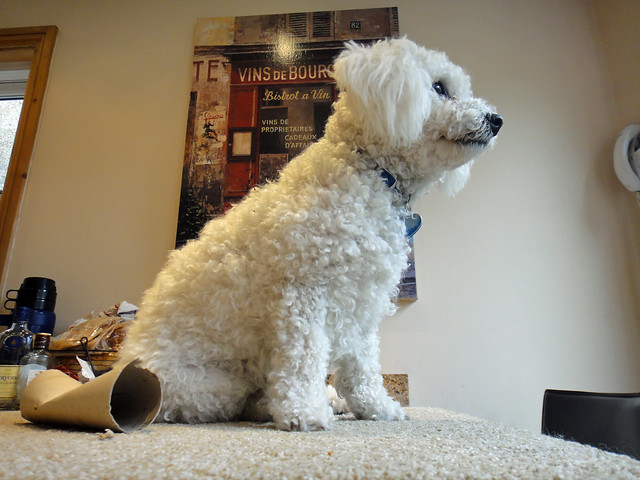 |
| Bichon Frisé (Photo credit: Wikipedia) |
Breed Characteristics
A cheerful attitude is the hallmark of the breed and one should settle for nothing less. Structural faults common to all breeds are as undesirable in the Bichon Frise as in any other breed, even though such faults may not be specifically mentioned in the standard. Any color in excess of 10% of the entire coat of a mature specimen is a fault and should be penalized, but the color of the accepted shadings should not be faulted in puppies. On March 5, 1933, the official standard of the breed, as written by Madam Abadie of Steren Vor Kennels, was adopted by the Societe Central Canine de France. The International Canine Federation recognizes the Bichon Frise "as a French-Belgian breed having the right to registration in the Book of Origins from all countries". When seeking a Bichon be sure to find a reputable breeder to get the best personality traits this breed has to offer. Another way to locate a quality breeder is to contact your local Bichon Frise club.
Puppies
Puppies are very fragile creatures and can easily break bones if they are dropped, kicked, or fallen on. Puppies commonly have the buff, apricot or cream color on their ears or head that will almost always fade to complete white. Puppies learn valuable lessons in the first eight weeks of life from their mothers that cannot be learned from anyone else or at any other time in life. As puppies, some Bichons have beige to apricot markings on the head or body, but this color usually fades during maturity. Talk to different breeders and ask them about their puppies and temperament of the dogs what care and needs are needed for their specific breed. Then check out dog rescue agencies, adoption dogs for sale and puppies for adoption as they would all make great pets. Pride and integrity are an integral part of raising great Bichons and placing beautiful puppies in qualified homes.
Because dysplastic dogs often produce dysplastic puppies, buyers should ask if both the sire and the dam of the puppy in which they are interested to have been rated clear of hip dysplasia by the Orthopedic Foundation for Animals or by Penn HIP. Because of the Bichon Frise Puppies lively personality, they usually get along well with most other animals in the household. These puppies are best house-trained in a suitably sized dog crate; one that is big enough for an adult Bichon to stand and turn around freely.
Training
The Bichon Frise is an intelligent breed, but they typically are difficult to housetrain. Housetraining is not difficult provided you follow instructions and set aside some time to do it right. Crate training makes it much easier to house train the dog. The Bichon Frise dog can become spiteful and stubborn if he isn't treated with positive training methods and lots of love. Without having to spend a small fortune and without having to spend hours grooming and training. This personality-filled and intelligent companion will definitely require guidance and loving training to become an exceptional performer (no doubt, it's his/her nature) that also doubles as your best friend. Plus training your dog is not only for your benefit, but also for your Bichon Frise's happiness, health, safety, and overall well-being. Consistent, firm, caring and positive love is important in training your Bichon Frise. Basic obedience training should be commenced as early as possible to ensure that the Bichon develops into an enjoyable friend and is acceptable to society in general.
The right dog for you?
Though not much of a guard dog, the Bichon Frise is a more than respectable watchdog. The Bichon Frise is a companion that has been compared to a cloud, but not because he is a lightweight. The Bichon Frise is similar in size to many toys at 9-11" and finely built he is a merry little dog who is lively enough to enjoy playing with children but perhaps not one too well-suited for country rambles. The average lifespan of the Bichon Frise is about 14 years. The Bichon Frise is known as a friendly and playful dog that is rarely aggressive. The Bichon Frise is suited to anyone who wants a companion dog.
|







